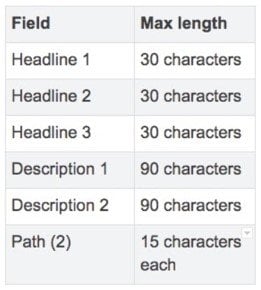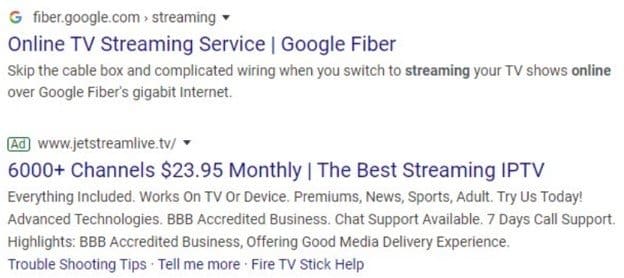First impressions matter and your pay-per-click (PPC) headlines are no different. Start off on strong footing with these nine headline hacks for writing successful ads.
1. Maximize Your Real Estate
Communicating your business or product can be difficult in just a few words, so make every headline count. This applies to the ad copy, as well. By maximizing your ad space with longer, more meaningful headlines, descriptions, and path fields, you’ll occupy more territory in the search engine results page (SERP).
Use this chart below as a reference when planning your own ad copy.

2. Speak Their Language

The more closely your headline matches the searcher’s query, the more likely they are to click your ad. Create compelling ads that are relevant to their keywords and the landing page they’ll be clicking to. As a bonus, the keywords used in the search are bolded in the ad copy, making them more eye catching.
But don’t go overboard – you can get disapproved for keyword spamming. Place keywords naturally in your ads, and you’ll start seeing better results.
3. Empower Action

If you’re seeing high clickthrough rates, but low conversions, be direct in your ads and tell the searcher exactly what you want them to do when they click to your landing page. Clear calls to action (CTAs) include “learn more,” “buy now,” or “call to make an appointment.”
Empower your potential clients to take a desired action and follow through with your landing page. CTAs help push prospects further along the sales funnel, and are more likely to result in stronger leads and higher conversion rates.
4. Highlight Your USP
Focus on the unique selling propositions (USPs) that make your company stand out from the competition. Why should a customer buy from you versus another?
Do you offer a “free trial,” “24/7 customer support,” or is your company “100% organic?”
You can even take this one step further by presenting your business as a solution to a relatable problem. At the end of the day, it all boils down to what you can do for the client that others can’t.
5. Use Numbers
In a SERP full of letters, be a number. Prices, percentages, and dates really pop through all the noise and allow the brain to scan information quickly – drawing eyes to your ad first!

Which of the two above ads stand out to you?
Numbers also give users definitive data upfront to build trust and authority, letting your buyers know exactly what they’ll get before even landing on your website.
6. Weed Out Unqualified Clicks
Say you’re advertising a specialty service that only runs on weekends, or an expensive, higher-quality product. Naturally, you’ll want to avoid paying for clicks that will never convert. By including descriptive qualifiers like “luxury service,” “starting at $99.95,” or “every Saturday & Sunday,” you can help to turn away those unqualified leads before they click your ad.

“Italian Wool, Made in Europe” and “luxurious fabrics” very clearly give the impression that these men’s suits are not cheap. To drive that message further, they list a starting price in their price extension.
7. Offer an Incentive
Nothing is more attractive to a potential buyer than savings. Use current sales in your headlines, descriptions, and ad extensions.

Further entice your buyers to convert or forever be left in FOMO – fear of missing out – purgatory by using phrases like “buy now,” “sale ends 3/1,” or “free gift while supplies last.”
8. Be Authentic
Stick to promotions, sales, and promises your business can back up. Nothing hurts your brand’s integrity more than advertising misleading or false claims.
Promoting “free shipping” in your ads is a great incentive, but when your prospect gets to your site and realizes they have to spend $150 to qualify…. Well, they might turn to a trusted site like Amazon, known for free shipping with no strings attached.
Don’t waste your limited ad space – instead highlight your unique selling points.
9. Test, Test, and Test!
The only constant is change. Never forget to test variants of your ads to find what works best for your business today.
Try A/B testing, which both Google Ads and Microsoft Bing Ads offer with their Experiments programs. Apply the changes to your current campaigns if you’re happy with the results, or simply end the experiment with no permanent repercussions.
Bonus tip: Don’t forget to review your ads for spelling, punctuation, and grammatical errors. It’s easy to let an apostrophe slip, or forget about linguistic and cultural differences when writing international ads (such as “harbor” in the U.S. versus “harbour” in Canada and Europe).
If you can’t even spell correctly in your ads, prospective customers may wonder what other mistakes you’ll make when doing business with you.








